Blog Post On 17th Annual IIPSJ CLE Conference
17th Annual IP & Social Justice CLE Seminar
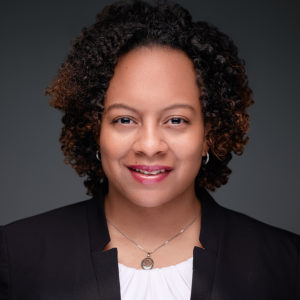
by Tashia Bunch, CLE Co-Chair
Thank you to all that participated in the 17th annual IP and Social Justice CLE program. Our program is the longest running IP and social justice CLE program in the country. We work hard to start conversations surrounding diversity in IP and to help ensure these conversations continue to take place. And our conversations aren’t just theoretical, we focus on real world solutions for increasing awareness of social justice issues and diversity in the field of IP. We focus on diversity in several ways; diversity of our CLE panelists, diversity of attendees, and discussions of how IP ownership impacts diverse communities.
Diversity of our CLE panelists: Every year we feature Howard Law alumni on our panels and we attempt to include someone from a minority group on every panel. This year all but two sessions included a minority speaker.
Diversity of attendees: Each year we attract a highly diverse audience to attend our program. This year, the program was held at Howard University School of Law attracting students and alum of the prestigious HBCU (Historically Black Colleges and Universities). Additionally, we offer a discounted rate for alumni of Howard Law and next year we expect to expand that discount to attendees that are alumni of any HBCU in the nation.
Discussions of impact of IP on diverse communities: Every year, we ask all of our speakers to be sure that they discuss the social justice implications of the topic they are covering at our program. We also host a social justice luncheon which annually features one or two discussions of IP rights and social justice.
This year, we had sessions featuring discussions on ways to increase diversity in the IP bar, including federal judges offering career and practice tips to Howard Law students in attendance to increase the pipeline into the profession to in house counsel discussing ways to increase diversity and inclusion at their own companies and within the law firms they work with.
This year’s social justice luncheon featured two topics. The first was a discussion of the recently passed California Pay to Play Act and the fairness of allowing student athletes to be compensated for use of their name, image, or likeness and what this law and others like it that are being circulated in state legislatures around the country could mean for student athletes. The second panel “Remembering Invention of a Slave: Patents and the Continuing Struggle for Civil Rights” discussed inventorship and the struggle to acquire patents in the African American community.
If you weren’t able to attend this year, you missed a day of lively and engaging discussions. We hope that you will consider joining us next year. Thanks to one of our sponsors, Microsoft, we were able to record several of the CLE sessions this year. We plan to share some of these videos with you throughout the year to encourage you all to engage in these conversations.
Please save the date for next year’s conference – Friday, March 5, 2021
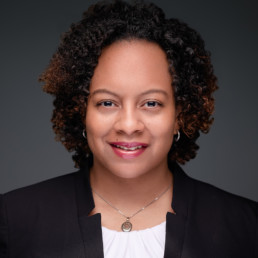
Tashia is a 2006 graduate of Howard University School of Law, which is how she first learned about IIPSJ. She currently works as a Legal Policy Attorney in the Office of the Deputy Commissioner for Trademark Examination Policy at the United States Patent and Trademark Office (USPTO). Previous positions at the USPTO included serving as the Acting Trademarks Chief of Staff and as a trademark examining attorney.
Blog Post On IIPSJ Participates in Event at Copyright Office
IIPSJ Joins Copyright Office to Discuss Social Justice and Empowering Creators of Color to Protect Their Creative Works
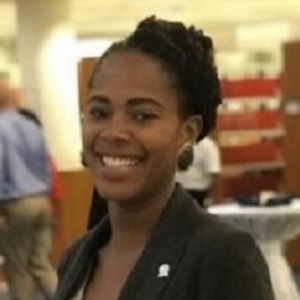
by Morgan Sills, Howard University School of Law ’21
On January 15 th the U.S. Copyright Office hosted a panel entitled “Copyright and Social Justice,” as part of its Copyright Matters series. The event explored the intersection of social justice and copyright protection, with a special focus on historically disadvantaged communities that are often unable to access protection for their work.
Opening remarks were given by Hakeem Jeffries, who is a U.S. Representative from New York and a member of the House Subcommittee on Courts, Intellectual Property, and the Internet. Representative Jeffries began the event by stressing the Constitution as the foundation of power for copyright protection and recognizing the emphasis placed on intellectual property rights by the Founding Fathers.
As the first panelist to speak, IIPSJ Founder, Professor Lateef Mtima, set the framework of the discussion by highlighting the social injustice surrounding communities that are unable to use the copyright system to protect their creations. As a result, the copyright system and structure of intellectual property rights as a whole both suffer from the exclusion of their talents and cultural contributions. IIPSJ’s Executive Director, Kim Tignor, reflected on the experiences of hip-hop groups like De La Soul and their noticeable absence from digital streaming services to illustrate the barriers faced by many artists today. She explained that there is a need to “decode” the copyright law so that artists can fairly profit from their efforts; and pointed out how the legal community often fails to educate creators on their ability to use digital space for the fair distribution of their work.
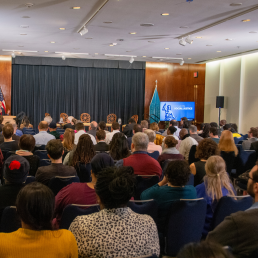
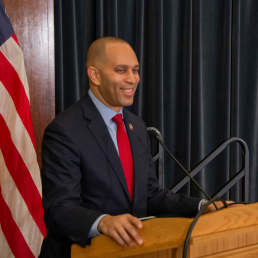
Hollis Wong Wear, a Grammy-nominated singer, songwriter, and producer, presented her perspective as an artist and advocate for other creatives. She voiced the idea that copyright lawyers can learn a great deal from artists and how legal regulations shape their reality, especially with expanded access through social media. She also used the example of Prince and his highly publicized fight against Warner Bros. to gain ownership of his master sound recordings, noting the social and economic impacts of such victories.
Law Professor and Co-Director of the IP Program at George Washington Law, Professor Robert Brauneis reported his findings after conducting research on thirty-five years of registration history. Consistent with the
reports of the previous panelists, Professor Brauneis reported that certain minority groups owned a significantly low number of actual copyright registrations compared to the amount of copyright eligible work they produced. He pointed to the CASE Act as a remedy for this situation, in
addition to the power of copyright attorneys and policy makers to serve creators and educate them on the best tools to benefit from their labor.
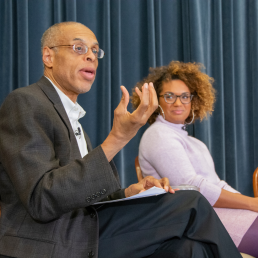
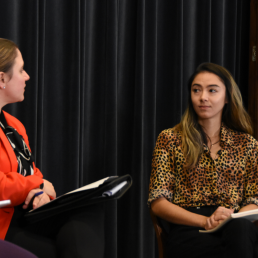
Arts and Entertainment Advocacy Clinic
Services offered: The Arts & Entertainment Advocacy Clinic allows students to develop substantive legal knowledge in copyright and related areas of law as well as practical skills in research, writing, and advocacy by counseling clients and preparing legal and policy documents on behalf of artists and creators.
Information Packet for the Legal Clinic - Practical Preparation of Patent Applications.
Glushko Samuelson Intellectual Property Law Clinic
Services offered: The full range of intellectual property specialties — copyright, patent, trademark, and beyond — in a variety of settings — including client counseling, rights acquisition, transactional lawyering and negotiation, litigation, and administrative and legislative advocacy.
Eligibility criteria: Individual creators and users of intellectual property, small businesses and communities of rights holders and consumers, not for profit institutions and associations, and other entities.
Regions covered: All
Fees charged: Free, however clients generally must pay for other costs of legal representation, such as governmental filing fees and litigation-related costs.
Detkin Intellectual Property and Technology Legal Clinic
Services offered: The IPC provides pro bono transactional patent, copyright, trademark and trade secret services to individuals, non-profit and for-profit clients in technology and the arts.
Entrepreneurship Legal Services
Services offered: Start-up company IP issues, such as trademark applications, provisional patent applications and patent research.
Eligibility criteria: Must be a start-up company without significant revenue.
Regions covered: All
Fees charged: $25.00 per hour for student time
Cyberlaw Clinic
Services offered: The Clinic maintains an active practice in intellectual property advising, including risk assessment, and has drafted a wide range of transactional documents that relate to IP rights (including license agreements and other documents concerning transfers of intellectual property).
MMA
Update on the Passage of the Music Modernization Act
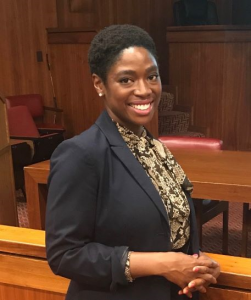 - Idia Egonmwan, a 2L student attorney in the Intellectual Property Clinic at Howard University School of Law.
- Idia Egonmwan, a 2L student attorney in the Intellectual Property Clinic at Howard University School of Law.
As many of our membership will recall, earlier this year IIPSJ submitted to Congress both formal comments and also a letter on behalf of intellectual property law and other scholars to support passage of the Compensating Legacy Artists for their Songs, Service, and Important Contributions to Society (CLASSICS) Act and the Music Modernization Act (MMA), and otherwise undertook a public campaign in support of these legislative bills. We are pleased to report that these and other grassroots and other efforts were successful and both acts were passed by Congress on September 18, 2018 (combined into a revised Music Modernization Act) and signed into law by President Trump on October 11, 2018.
What is the Music Modernization Act (MMA)?
The MMA mitigates many of the economic and social inequities perpetuated in the music recording business by creating uniformity in legal protection for pre- and post-1972 sound recordings via the federal copyright system.[1] The MMA is broken into three parts:
- Title I establishes a musical licensing collective to issue and administer blanket mechanical licenses for the use of sound recordings to digital music services and to and collect and distribute royalty payments directly to rights owners, including performing artists;
- Title II compensates pre-1972 sound recording artists by creating a royalty structure; and
- Title III creates a legal right for various musical contributors (producers, mixers, and sound engineering) to collect royalties for digital transmissions of sound recordings.[2]
The IP Social Justice Impact of the MMA
African American and other marginalized creators and artists have historically suffered from legal and social limitations upon their freedom to contract, inequities exacerbated by the systemic manipulation and abuse of the copyright law and music sound recording contracts and licensing agreements. “Legacy” recording artists such as Otis Redding, Martha Reeves and the Vandellas, and the Temptations were especially disadvantaged in that copyright protection did not extend to pre-1972 sound recording.[3] As a result of the passage of the MMA, composing artists will benefit from more equitable royalty structures under the Copyright Section 115 compulsory mechanical (recording) license (which historically exploited the inferior bargaining power of all artists, but particularly artists of color) (Title I); limited music copyright protection in the form of a digital performance right has been extended to pre-1972 “Legacy” sound recording artists (Title II); and a right for previously uncompensated producers, mixers, and sound engineers to collect royalties for their creative contributions has been established. (Title III).
Fair Compensation and IP Social Justice for Music Creators and Performers
The Music Modernization Act (MMA) is a progressive step for copyright law and the American recording industry, ultimately providing legacy, current, and future musical artists with more equitable compensation for creating, sharing, and performing their work. Utilizing intellectual property as a means of social justice in the music industry is a small subset of how IP law can be used to empower and rebuild marginalized communities. Although not perfect, the MMA represents the outcomes that can be achieved when legal scholars, legislators, and intellectual property and other social justice activists collaborate to preserve the purpose of copyright and other intellectual property law: to promote and encourage socially equitable and beneficial creative labors.
[1] See the Letter from Lateef Mtima, Dir., Institute for Intellectual Property & Social Justice, to Chuck Grassley, Chairman, U.S. S. Comm. on the Judiciary, Dianne Feinstein, Ranking Member, U.S. S. Comm. on the Judiciary, Bob Goodlatte, Chairman, U.S. House of Rep. Comm. on the Judiciary, Jerrold Nadler, Ranking Member, U.S. House of Rep. Comm. on the Judiciary (Mar. 14, 2018)
[2] See Mark Wittow, A Modern Melody for the Music Industry: The Music Modernization Act Just Passed Congress and Awaits Presidential Approval, The Nat’l Law Review (Oct. 2, 2018), https://www.natlawreview.com/article/modern-melody-music-industry-music-modernization-act-just-passed-congress-and-awaits
[3] Id.
Student Summary: Tam
Summary from a Student: IIPSJ Roundtable: The Aftermath of In re Tam
- Alexis Harrison, rising 2L, Howard University School of Law
This panel discussion included the following speakers; Phillip Hampton, senior counsel at Haynes & Boone 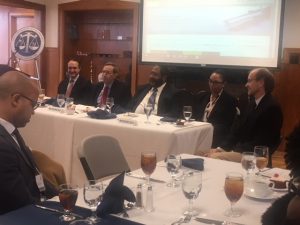 LLP; Toni Hickey, Deputy General Counsel & Chief IP Counsel at Cummins, Inc.; William Thomashower, counsel at Pryor Cashman LLP and; Douglas A. Rettew, partner at Finnegan, Henderson, Farabow, Garrett & Dunner, LLP. It was moderated by Stephen McJohn, a professor at Suffolk University School of Law. The discussion centered around the implications arising from the holding of In Re Tam. Here the Court reversed its course, holding that it is unconstitutional for the Patent and Trademark Office to deny the registration of disparaging content. Attorney Thomashower compared the effect of the opinion to the opening of the Pandora’s box. He is also concerned that the opinion made no mention of a chilling effect in disallowing disparaging content from being registered, while still permitting its use. Another critique found it unfortunate that the Court also did not mention the level of scrutiny used in the opinion.
LLP; Toni Hickey, Deputy General Counsel & Chief IP Counsel at Cummins, Inc.; William Thomashower, counsel at Pryor Cashman LLP and; Douglas A. Rettew, partner at Finnegan, Henderson, Farabow, Garrett & Dunner, LLP. It was moderated by Stephen McJohn, a professor at Suffolk University School of Law. The discussion centered around the implications arising from the holding of In Re Tam. Here the Court reversed its course, holding that it is unconstitutional for the Patent and Trademark Office to deny the registration of disparaging content. Attorney Thomashower compared the effect of the opinion to the opening of the Pandora’s box. He is also concerned that the opinion made no mention of a chilling effect in disallowing disparaging content from being registered, while still permitting its use. Another critique found it unfortunate that the Court also did not mention the level of scrutiny used in the opinion.
Another effect described is the registration of distasteful content in order to limit their use and abuse by other inciting or hateful groups. However, attorney Hickey countered that this would pose a difficult challenge for communities and populations of people that do not have the financial resources to pursue this method of reclaiming distasteful or hateful content. Additionally, attorney Hickey described the impact of the opinion for the average citizen. There is no longer a reliable standard for citizens to consider in determining immoral content.
When asked to consider legislative solutions to the opinion, the panelists concluded that a fix from this branch of government is unlikely and erroneous. Instead, attorney Thomashower described the role of the courts. The objective test should be applied by judges to determine the standard for disparaging content. This is not censorship he argued, because the government has a genuine interest in restricting the registration of content which could lead to a dangerous or inciting result. Nonetheless, attorney Hampton emphasized that the Trademark Office is still pretty conservative, and thus there is an initial layer of bias with the examiners.
Student Summary: Entertainment
Summary from a Student: Entertainment Law Update: Developments in Trademark and Right of Publicity Law
- Lauren J. Walker, rising 3L, Howard University School of Law
The laws surrounding trademark and rights of publicity are developing as intellectual property laws continues to advance. Jonathan Goins and Benita Collier, professionals in the intellectual property sphere shared their expertise on the law and its relationship to the entertainment industry. The panel opened with a Top 10 list of issues that are currently prevalent within media and entertainment law. The issues from the perspective of the brand owner ranged from Trademark Infringement, Trademark Advertising and Federalization of Trade Secret Laws. On the contrary, from the perspective of the individual being accused of infringement the popular issues were Fair Use and the use of the mark in relation to one’s First Amendment rights.
Jonathan Goins is currently a partner at the Atlanta office of Lewis Brisbois Bisgaard & Smith, LLP where he is a member of the firms Intellectual Property & Technology and Entertainment, Media & Sports Practices. With over 15 years of legal experience, Goins has been identified as a leader in Intellectual Property Law.
Bernita Collier is Associate General Counsel at Urban One. In this role she manages intellectual property for four different major media markets. In managing these markers her responsibilities are distributed amongst radio, digital, and television.
Two of the landmark cases that were referenced during the panel were Twentieth Century Fox Television v. Empire Distribution and Curtis Jackson v. William Roberts. In Empire, the question before the court is whether the use of Empire Records was infringement under the Lanham Act and trademark law. The court found that the use of the record distribution company that previously existed and slightly parallels the portrayed record company in a television show would not cause consumer confusion and would not be trademark infringement. On the contrary, in Jackson the question presently before the court is whether the actual usage of popular rapper 50 Cent’s (Curtis Jackson) voice in rapper Rick Ross’s (William Roberts) song is copyright and right of publicity infringement. The use of Jackson’s voice is 19 seconds in a 3-minute song so the court will need to address whether the use of the voice from a song that has a copyright constitutes copyright infringement and is not fair use. Additionally the court will decide whether this use is a violation of Jackson’s right of publicity since this song will likely be sold and Roberts may earn financial gain.
Panelists Goins and Collier established that no celebrity is exempt from intellectual property lawsuits. Entertainer Beyonce Knowles was recently sued by a Russian artist for the use of her voice in Beyonce’s song. The court found in favor of Knowles for di minimus use and First Amendment Fair Use.
To close the panel each panelist discussed the array of issues that they may handle during the day given their roles but shared the importance of staying up to date with the law as it develops, the need to have a good relationship and open communication among all parties, and the importance of correctly advising your client.
